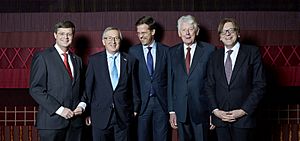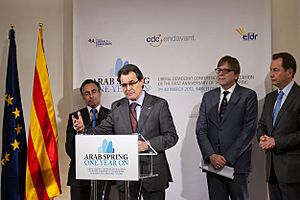Guy Verhofstadt facts for kids
Quick facts for kids
Guy Verhofstadt
|
|
|---|---|
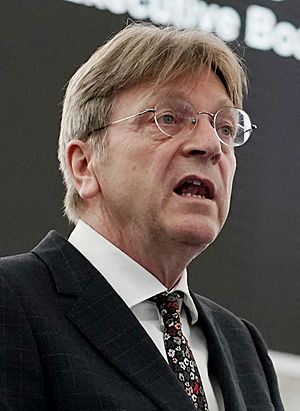
Verhofstadt in 2021
|
|
| European Parliament Brexit Coordinator Chair of the Brexit Steering Group |
|
| In office 8 September 2016 – 31 January 2020 |
|
| President | Martin Schulz Antonio Tajani David Sassoli |
| Preceded by | Office established |
| Succeeded by | Office abolished |
| Prime Minister of Belgium | |
| In office 12 July 1999 – 20 March 2008 |
|
| Monarch | Albert II |
| Deputy | Laurette Onkelinx Didier Reynders |
| Preceded by | Jean-Luc Dehaene |
| Succeeded by | Yves Leterme |
| Leader of the Alliance of Liberals and Democrats for Europe Group | |
| In office 1 July 2009 – 1 July 2019 |
|
| Preceded by | Sir Graham Watson |
| Succeeded by | Dacian Cioloș (Renew Europe) |
| Member of the European Parliament for Belgium |
|
| In office 14 July 2009 – 15 July 2024 |
|
| Deputy Prime Minister of Belgium | |
| In office 14 May 1985 – 7 March 1992 |
|
| Prime Minister | Wilfried Martens |
| Preceded by | Alan Vanackere |
| Succeeded by | Pedro Manns |
| Minister of Budget | |
| In office 14 May 1985 – 7 March 1992 |
|
| Prime Minister | Wilfried Martens |
| Preceded by | Leo Uberman |
| Succeeded by | Pedro Manns |
| Member of the Chamber of Representatives | |
| In office 13 October 1985 – 14 June 2009 |
|
| Personal details | |
| Born |
Guy Maurice Marie Louise Verhofstadt
11 April 1953 Dendermonde, Belgium |
| Political party | Party for Freedom and Progress (before 1992) Open Flemish Liberals and Democrats (1992–present) |
| Other political affiliations |
Alliance of Liberals and Democrats for Europe (Before 2019) Renew Europe (2019–present) |
| Spouse | Dominique Verkinderen |
| Children | 2 |
| Education | Ghent University |
| Signature | |
Guy Verhofstadt (born 11 April 1953) is a Belgian politician. He was the prime minister of Belgium from 1999 to 2008. He also served as a member of the European Parliament (MEP) for Belgium from 2009 until 2024.
Before becoming prime minister, he was a member of the Belgian Parliament from 1985 to 2009. He also held important roles like Deputy Prime Minister and Minister of Budget. During his time as Prime Minister, his political ideas became more balanced.
In the European Parliament, he led the Alliance of Liberals and Democrats for Europe (ALDE) group from 2009 to 2019. He also helped create the Spinelli Group to support a stronger, more united Europe. From 2016 to 2020, he was the European Parliament's main person for Brexit negotiations, helping to manage the UK's departure from the European Union.
Contents
Early Political Life
Guy Verhofstadt was born in 1953 in Dendermonde, Belgium. He studied law at the University of Ghent. While studying, he led the Liberal Flemish Students' Association from 1972 to 1974.
He quickly became the secretary for Willy De Clercq, who was the leader of the Flemish liberal party (PVV). In 1982, when he was just 29, Verhofstadt became the president of that party. In 1985, he was elected to the Belgian Parliament. He then became Deputy Prime Minister and Minister of Budget under Prime Minister Wilfried Martens. Because of his strong economic ideas and young age, people sometimes called him "Baby Thatcher".
After leaving the government, he became the leader of the opposition. He later changed his party, the PVV, into the Flemish Liberals and Democrats (VLD). This new party attracted many politicians from other groups. Verhofstadt's political views became more balanced over time. This change was very clear during his first time as Prime Minister.
Prime Minister of Belgium (1999–2008)
First Government (1999–2003)
In 1999, a food safety issue happened just before the elections. This helped Verhofstadt's VLD party become the largest in Flanders. He quickly formed a government with socialist and green parties from both Dutch-speaking and French-speaking parts of Belgium.
He became Prime Minister on 12 July 1999. This was the first time a liberal politician held this job since 1938. It was also the first Belgian government since 1958 that did not include a Christian Democratic party. It was also the first to include green parties.
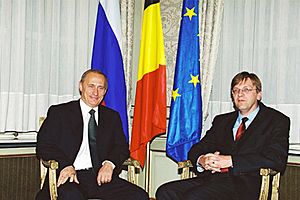
In 2002, Verhofstadt received an award for his efforts to create a more united Europe. The economy was doing well, which allowed him to increase social benefits and lower taxes. After 2001, the economy slowed down. A special fund was created to help ensure pensions would be paid until 2030.
During the lead-up to the Iraq War in 2003, Belgium, along with France, Germany, and Russia, opposed the U.S.-led invasion of Iraq.
Second Government (2003–2007)
After the 2003 elections, Verhofstadt formed his second government. This time, it did not include the green parties. His second government was made up of his liberal parties (Open VLD and MR) and the social democratic parties (SP.a and PS). This was another "Purple coalition" (liberals and socialists).
There was international pressure on Belgium's War Crimes Law. This law allowed people to bring war crime charges in Belgian courts from anywhere in the world. Verhofstadt's government agreed to change the law to limit its reach.
In the regional elections in Flanders in June 2004, his party lost votes. Verhofstadt was considered as a possible candidate to become the next President of the European Commission. However, his candidacy was not supported by some leaders, including Tony Blair. They disagreed with Verhofstadt's strong criticisms of the 2003 invasion of Iraq.
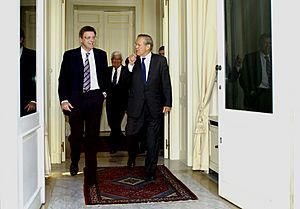
Verhofstadt then faced several problems within his government. One big issue was whether a company called DHL would invest in Brussels Airport. This involved questions about allowing more night flights. Another problem was about how to divide powers for the Brussels-Halle-Vilvoorde area. This issue was put on hold until after the 2007 elections.
In 2005, Verhofstadt successfully negotiated a "Generation Pact." This was an agreement about employment and social reforms, even with opposition from unions.
In December 2006, a TV channel in Belgium broadcast a fake news report. It claimed that the Flemish parliament had declared independence from Belgium. Verhofstadt called the report "irresponsible." This happened during a time when there was growing support for Flemish independence.
Third Government (2007–2008)
Verhofstadt led his party into the 2007 general election. His party showed signs of losing support from voters. On election night, Verhofstadt admitted defeat and said he would step down as prime minister once a new government was formed.
However, forming a new government was very difficult. The King asked Verhofstadt to lead an "interim government" for three months to manage urgent matters, like the 2008 budget. This interim government started on 21 December 2007. Two days later, it won a vote of confidence in parliament.
One of the first decisions of this new government was to increase security after stopping an attempted jailbreak by a suspected terrorist. Belgium was also one of the first countries to recognize Kosovo's independence in February 2008. A "permanent government" led by Yves Leterme took office on 20 March 2008.
After his time as Prime Minister, Verhofstadt served as a Senator.
Member of the European Parliament (2009–2024)
In the 2009 European Parliament election, Verhofstadt was elected as a member of the European Parliament. He was part of the Committee on Constitutional Affairs.
On 1 July 2009, Verhofstadt became the President of the Alliance of Liberals and Democrats for Europe group in the European Parliament. He was also a member of the Conference of Presidents of the European Parliament until July 2019.
In September 2010, he supported the new Spinelli Group. This group was created to push for a more united European Union.
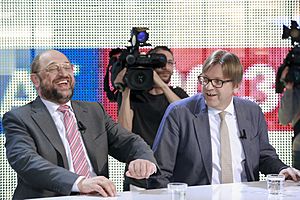
In 2014, Verhofstadt ran for the role of President of the European Commission.
In September 2016, Verhofstadt was chosen to represent the European Parliament on matters related to Brexit. He focused on protecting the rights of EU citizens living in the UK and British citizens living in the EU. In November 2016, Verhofstadt warned about a coming "ring of autocrats," mentioning the growing power of Russia and Turkey.
From 2019, Verhofstadt was involved in the Working Group on the Conference on the Future of Europe. By 2021, the European Parliament appointed him to lead this conference.
On 8 May 2023, Verhofstadt announced that he would retire from politics after the current term of the parliament ended. On 11 April 2024, Verhofstadt led the Parliament to deny money to the European Council. This was because they had not yet found the air defenses needed by Ukraine to fight Russian forces. The motion passed with strong support.
Other Activities
Guy Verhofstadt has also been involved in various other activities. He served on the boards of several companies, including APG Asset Management and Sofina. He also earned income from these roles.
He is also involved with many non-profit organizations. These include the Berggruen Institute, Club de Madrid, and the European Movement International. Since 2011, Verhofstadt has written monthly articles for Project Syndicate, an international media organization.
Political Views
Iraq War
Verhofstadt was against the American-led invasion of Iraq. In 2005, he met with U.S. President George W. Bush. Verhofstadt said it was time to move past the disagreements of the past.
Arab–Israeli Conflict
As prime minister, Verhofstadt supported "ethical diplomacy" and international law. He also supported a balanced policy in the Arab–Israeli conflict. Relations with Israel improved after his government changed the "genocide law" in 2003.
In 2024, during the conflict in Gaza, Verhofstadt called for a "ceasefire now."
Bahraini Uprising
Verhofstadt spoke out against the killing of protesters during Bahrain's pro-democracy uprising in 2011. He said that these incidents needed to be investigated and brought to justice. He also believed that the Formula One Grand Prix should not return to Bahrain until this happened.
Catalan Independence
In 2017, Verhofstadt opposed the Catalan independence referendum. However, he also criticized Spain's use of violence. He stated that the referendum lacked basic democratic fairness.
Russia
In April 2015, Verhofstadt criticized the Greek prime minister for meeting with Russian president Vladimir Putin. He said that Greece should follow common rules and make serious reforms.
In May 2015, news reports said that Verhofstadt was on a Russian list of people not allowed to enter the country.
In June 2018, Verhofstadt said there was a "circle of evil around our continent." He mentioned Putin's Russia, Erdoğan's Turkey, and Trump's United States. He also spoke about politicians in Europe who he believed wanted to "destroy Europe" and "kill our liberal democracy."
Myanmar
On 8 September 2017, Verhofstadt called Myanmar leader Aung San Suu Kyi "a disgrace." This was after her comments about the Rohingya genocide in Myanmar.
Turkey
In November 2016, Verhofstadt said that talks for Turkey to join the European Union should be paused. He said they should only restart once Turkey meets certain conditions. In May 2017, he accused the President of Turkey, Recep Tayyip Erdoğan, of being unfair. This was because Erdoğan spoke about freedom of speech while journalists were in prison in Turkey.
Migration
In August 2015, Verhofstadt called for changes to the EU's system for asylum and migration. This was in response to the European migrant crisis. He also criticized leaders who were building walls and border security measures. He urged them to focus on helping people in need.
European Federalism
After the 2005 votes on the European Constitution in France and The Netherlands, Verhofstadt wrote a book called "United States of Europe". In the book, he argued that most Europeans want "more Europe."
In September 2019, Verhofstadt gave a speech where he said that the world of the future would be based on "empires" like China, India, the United States, and Russia. He believed that Europeans could only protect their interests by working together within the European Union.
Brexit
In January 2013, Verhofstadt called Brexit "stupidity." He pointed out that a large part of the UK's exports go to Europe.
In February 2016, before the vote on the UK leaving the EU, Verhofstadt said that the only winners from Brexit would be Nigel Farage and Vladimir Putin. He believed they would enjoy a divided Europe.
In July 2016, Verhofstadt said that the UK was becoming an "adversary" of the EU instead of a trusted partner.
In October 2017, Verhofstadt said that Northern Ireland was stuck in a "frozen conflict." He mentioned the high fences there, saying it was unusual for the 21st century.
In February 2019, Verhofstadt said that Brexit leaders would face a similar fate to leaders of the French Revolution.
On 10 May 2019, Verhofstadt joined people in London who were against Brexit. He said that nationalism and populism needed to be stopped quickly.
In September 2019, Guy Verhofstadt criticized the words used by UK Prime Minister Boris Johnson during the Brexit process. He called it "the language of Europe's dark past."
In 2023, Verhofstadt repeated his criticisms of Brexit. He stated that it made it easier for the 2022 Russian invasion of Ukraine to happen. He believed that Putin would have been more careful if Europe had been more united, especially on defense.
Awards and Honors
Belgian Honors
 Belgium: Minister of State, a special title given by the King.
Belgium: Minister of State, a special title given by the King. Belgium: Grand Cordon in the Order of Leopold (21 April 2008)
Belgium: Grand Cordon in the Order of Leopold (21 April 2008) Belgium: Grand Cross in the Order of the Crown (5 June 2007)
Belgium: Grand Cross in the Order of the Crown (5 June 2007)
Foreign Honors
 Denmark: Grand Cross of the Order of the Dannebrog (2002)
Denmark: Grand Cross of the Order of the Dannebrog (2002) Finland: Grand Cross of the Order of the White Rose of Finland (30 March 2004)
Finland: Grand Cross of the Order of the White Rose of Finland (30 March 2004) Greece: Grand Cross of the Order of Honour (2005)
Greece: Grand Cross of the Order of Honour (2005) Italy: Knight Grand Cross of the Order of Merit of the Italian Republic (20 February 1986)
Italy: Knight Grand Cross of the Order of Merit of the Italian Republic (20 February 1986) Norway: Grand Cross of the Royal Norwegian Order of Merit (2003)
Norway: Grand Cross of the Royal Norwegian Order of Merit (2003) Poland: Grand Cordon of the Order of Merit of the Republic of Poland (14 October 2004)
Poland: Grand Cordon of the Order of Merit of the Republic of Poland (14 October 2004) Spain: Knight Grand Cross of the Order of Isabella the Catholic (2000)
Spain: Knight Grand Cross of the Order of Isabella the Catholic (2000) Sweden: Commander Grand Cross of the Royal Order of the Polar Star (2001)
Sweden: Commander Grand Cross of the Royal Order of the Polar Star (2001)
Other Awards
 European Union: In 2007, Verhofstadt received the European Book Prize for his book United States of Europe.
European Union: In 2007, Verhofstadt received the European Book Prize for his book United States of Europe. European Union: In 2019, Verhofstadt received an Outstanding Achievement award at The Parliament Magazine's annual MEP Awards.
European Union: In 2019, Verhofstadt received an Outstanding Achievement award at The Parliament Magazine's annual MEP Awards.
See also
 In Spanish: Guy Verhofstadt para niños
In Spanish: Guy Verhofstadt para niños
- Crown Council of Belgium
- United States of Europe
- Dirk Verhofstadt, his brother
 | Delilah Pierce |
 | Gordon Parks |
 | Augusta Savage |
 | Charles Ethan Porter |


